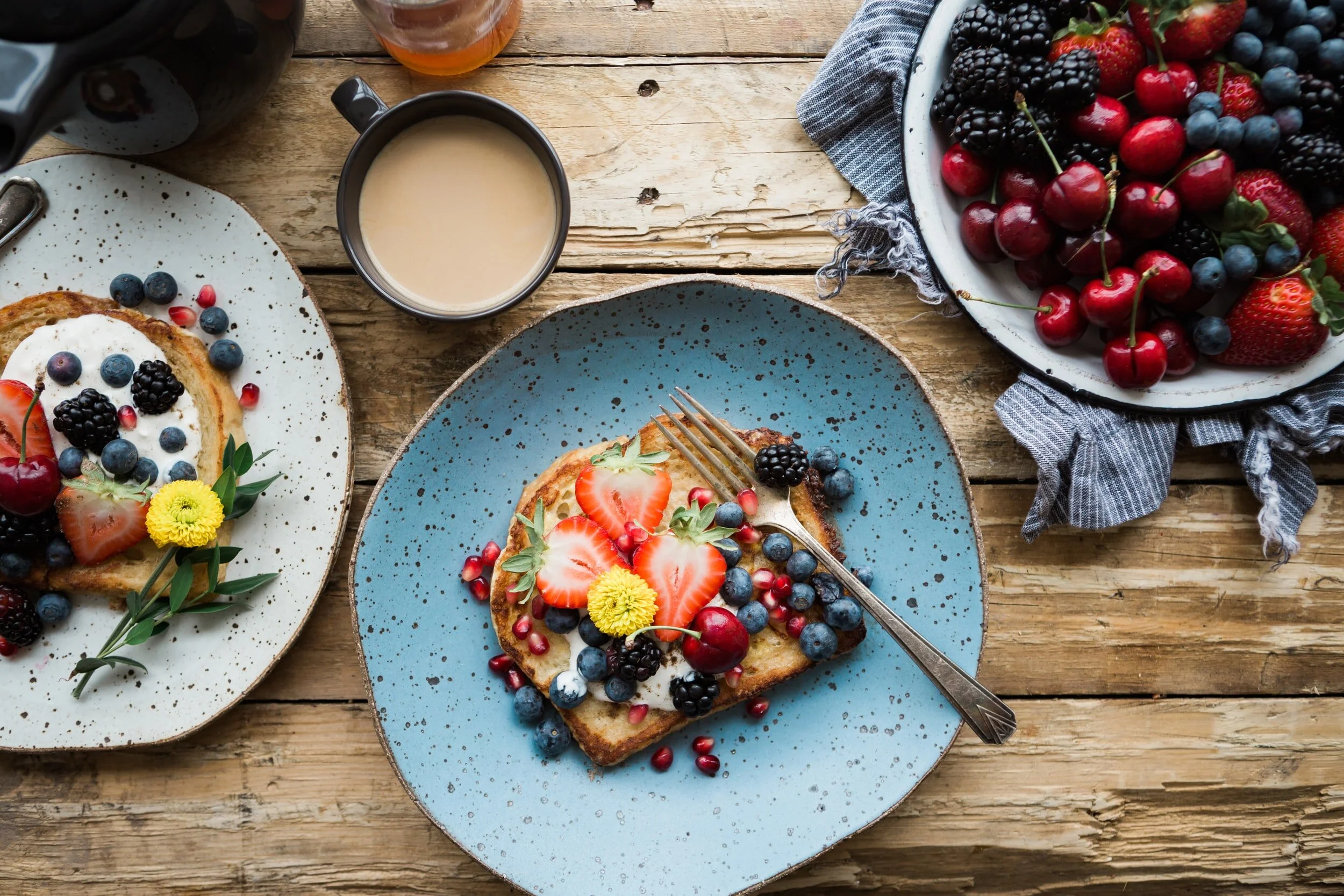Breakfast! Is it the most important meal of the day?
I’ll bet you’ve heard this affirmation more than a few times.
I was raised in the traditional way of accepting this norm as an unquestionable way-of-life.
It’s a line that was drummed into my head all through school and well into my military days. And when it wasn’t my Mom or a close family member or teacher – or eventually my drill sergeant – then it continued to be broadly enforced by relatives and friends. And the mainstream media. Heck, it’s probably commonplace to most of the world’s cultures.
I recall with crystal clarity how I would be checked and admonished if I dared leave home for school on an empty stomach. “How do you expect to stay awake in class, let alone concentrate!?”
But since my forties, I’ve turned that age-old tradition on its head. For the last 12-or-so years, my first meal of the day is lunch.
I probably eat breakfast intentionally maybe 10 times a year – usually when my family and I are on holiday at some or other resort that more-often-than-not includes an elegant spread. During these rare occasions, I truly do enjoy casually enjoying a cup of coffee having surveyed the buffet counter and contemplating what to put on my plate for that first meal of the day.
But let’s get real for a minute.
Reality-check
In truth, if you skip breakfast – whether accidentally or deliberately – there's really no need to feel guilty or concerned that you’re doing yourself a physiological injustice or insulting the Gods or your heritage – for that matter.
Despite what we've been told for decades, research (both scientific and anecdotal) has finally begun suggesting that breakfast is not the most important meal of the day, even if the belief is entrenched in many societies around the world.
I’ve done my own research over the years, and although there are tons of studies by universities, media companies and scientific entities, there is no conclusive position.
Like I often say to people who ask: Having breakfast – or not – depends on your particular condition, needs and wants.
In short: It’s highly individual.
What average people are asking
Just to show you how mindful or captivated people are (and perhaps on the wrong track), here are some of the top recent Google searches I found when revisiting the topic:
What is the most skipped meal of the day?
Is it really true that breakfast is the most important meal of the day?
What meal is the most important meal of the day?
Who says breakfast is the most important meal of the day?
Is it better to skip breakfast or dinner?
Which meal should I skip?
Is it OK to skip breakfast?
Is it unhealthy to skip breakfast?
Why you should not skip breakfast?
What is the most important meal of the day and why?
What is the 2nd most important meal of the day?
What is the best breakfast for heart patients?
Which meal is the best to skip?
What should I eat in the morning on an empty stomach?
Who says breakfast is the most important meal?
What should I eat for the second breakfast?
Is it unhealthy to skip meals?
Though I don’t wish to be judgemental, some of these really left me in fits of laughter. It’s pretty obvious that few of us are adequately informed, or take the time to become better informed about meals, their metabolic effects and daily calorie expenditure. What’s more, folks in certain cultures are inclined to be scorned for even suggesting otherwise.
Why I believe we’re looking at this all wrong
Did you know that over the course of a day, the caloric impact of food is the same, whether you‘re eating at 7am or 7pm?
It’s far more important ‘what’ your total daily calorie intake is.
Looking at things through the lens of optimal wellness, it basically comes down to this: If you eat breakfast and it suits you, a-n-d you’re happy with your progress and/or condition, then keep going that way.
I see the whole breakfast-eating thing as having simply and convenietly remained fashionable in modern post-industrial times, even when most of us no longer work in jobs involving the need to withstand hours and hours of physical labor.
However, what I see as far more effective today, is to approach eating with common sense and logic so that meals are consumed, not only to address feelings of hunger, but also strategically manage our appetites for weight loss, maintenance, or for that matter – weight gain, or even for optimal sports performance.
So let’s ask that question again, while turning tradition upside down.
The most important meal of the day is?
My simple and final answer from a health and fitness point-of-view: The one that serves your particular needs and goals best. Not the one that everyone else is doing, or the easier option because you’re feeling lazy. Eating any particular meal without a deliberate reason, or for any specific or intended outcome, means you’re plodding along through life without any real goal.
This is okay – if you’re not bothered about being or getting into great shape.
This is pretty much what the majority of the world’s population does. It doesn’t mean that you’re ‘wrong’, just that you’re a willing passenger being transported along in an existence of mediocrity – at least from the point-of-view of health and physical wellness.
Again, if this serves your needs, great. But if you’re entertaining the thought of fulfilling a wellness voyage or transformation towards becoming the best physiological version of yourself, then there are a few things to note about meal number 1.
So let’s unpack this concept a little more.
What are your needs, wants and intentions?
I did mention particular needs and intentions earlier on. Let me go a little further on that point, but without becoming too technical.
It means you need to become a little more mindful about your eating, especially if you’re embarking on a shape-up journey.
Being aware of your eating habits is one of the first things to start doing when you want to change your body. What do I mean? Well, of course we want pleasure from eating. But if we forego knowing or ensuring that the nutritional profiles are serving us, then we’re back to going nowhere fast.
So, in a nutshell, my entire work is grounded in marrying those two concepts: Nourishment and pleasure. It’s the whole raison d’être of MFR and the Sensible Fitness Program.
You pretty much want to support your fitness plan and feel satiated. In other words, the timely delivery of energy and/or recovery, as well as mental acuity – while pushing the envelope of fitness or sporting achievements.
What the research is saying
Although inconclusive, research does show that consuming breakfast won’t necessarily ‘reduce hunger’ or support mental alertness and productivity later in the day.
According to a study published in the British Medical Journal (“Effect of breakfast on weight and energy intake“) by Monash University professor and head of rheumatology at Alfred Hospital, Flavia Cicuttini, “We found that breakfast is not the most important time of the day to eat, even though that belief is really entrenched in our society and around the world.”
So it looks like eating breakfast does not guarantee that you won't feel hungry later on. There's no evidence that changing an eating plan to include breakfast will better enable weight loss.
Prof Cicuttini goes on to say that even if previous studies have suggested that eating breakfast is linked to maintaining a healthy weight, those findings have been observational and may reflect an individual's wider healthy lifestyle and food choices.
Said differently, the focus should be not placed on when we eat our largest meal of the day – whether it's at lunch or breakfast – but on total daily calorie content.
Returning to the aspect of ‘reasons‘ for having breakfast, there are many: Growing children might want to eat before they leave home for school, older people might need to eat after taking medication – or it could be a cultural tradition. Or as I referenced above when I’m on holiday, one might genuinely enjoy eating breakfast.
As the Professor underscores: “So if you eat breakfast and it suits you, then you shouldn’t change. But what we tend to see is that there’s a strong push towards eating breakfast because ‘you should’. Well, the evidence now says that’s not the case."
Of course research never ends, and this topic continues to be scrutinized and much more evidence is needed to more fully assess the impact of breakfast on metabolism and weight. However, as the study reads: “currently, the available evidence does not support modifying diets in adults to include the consumption of breakfast as a good strategy to lose weight.”
Basic benefits of intermittent fasting (IF)
Although a more in-depth review of intermittent fasting will be published separately, I felt it opportune to briefly explain the protocol, and list some of its benefits, based on research.
From losing weight to normalizing blood sugar control, fasting can affect health in a number of ways.
Generally, most fasts are performed over 24–72 hours, cycling between periods of eating and abstaining. My own protocol usually follows a pattern of fasting from 22h00 to 12h30 the next day, though there are several designs ranging from a few hours to a few days.
Fasting has been shown to have many health benefits, from increased weight loss to better brain function. Here’s a list of 8:
1. IF promotes better blood sugar control by reducing insulin resistance
2. IF promotes better health by reducing inflammation
3. IF may enhance heart health by improving blood pressure, triglycerides and cholesterol levels
4. IF may boost brain function and prevent neurodegenerative disorders
5. IF aids weight loss by limiting calorie intake and boosting the metabolism
6. IF increases growth hormone secretion, which is vital for growth, metabolism, weight loss and muscle strength. The payout here is increased fat loss while simultaneously preserving muscle tissue
7. IF may delay aging and extend longevity
8. IF may aid in cancer prevention and increase the effectiveness of chemotherapy
IF is a great protocol if you can tolerate intervals of not eating, or eating very little for certain hours. It can assist you in losing weight, improving your metabolic health, and in maintaining lean mass. Granted though, by design, it is not going to suit everyone.
Bottom line
I think it’s pretty clear, and I believe we’ve come full circle back to my initial point:
It comes down to what works (or will work) for you.
I personally love intermittent fasting. It allows for better appetite control and gives me more calories to play with from lunchtime onwards. It’s how I’m able to maintain my condition while eating my favorite foods, with supper (plus dessert) as my main meal of the day.
You see, your stomach, metabolism and overall constitution don’t know – neither do they care – what time of day you eat your first meal. Neither does it matter how many meals you consume in a day.
When it comes to ingesting food, what really counts is whether you’re feeling satiated enough, whether you’re hitting and/or maintaining your desired outcome. And for professional sportspeople, whether you’re sufficiently AND correctly fueled (at the required moment) and primed to compete at the highest levels.
REFERENCES:
Image courtesy of: Brooke Lark on Unsplash



